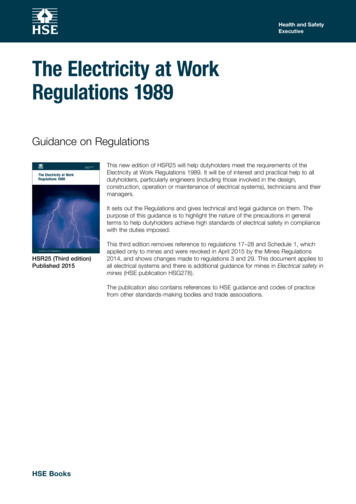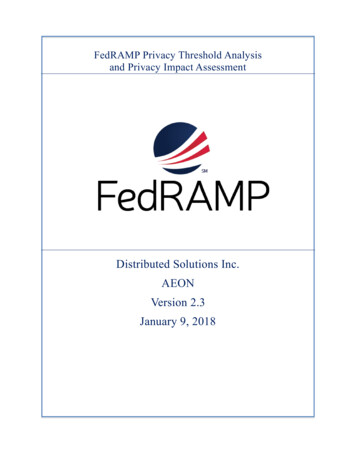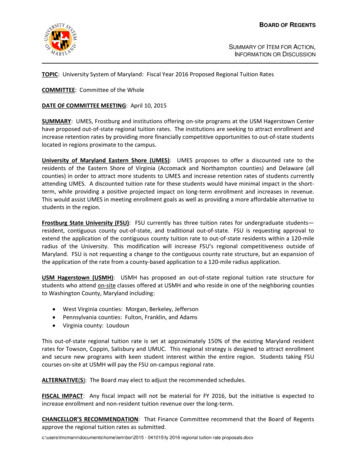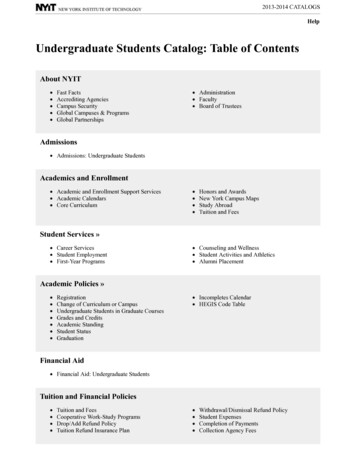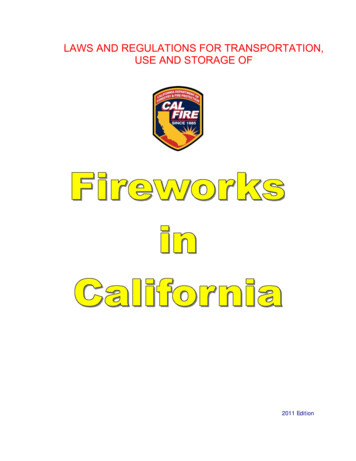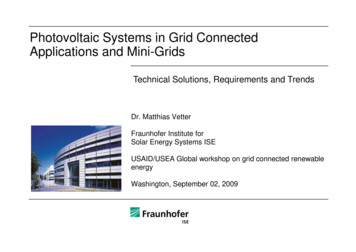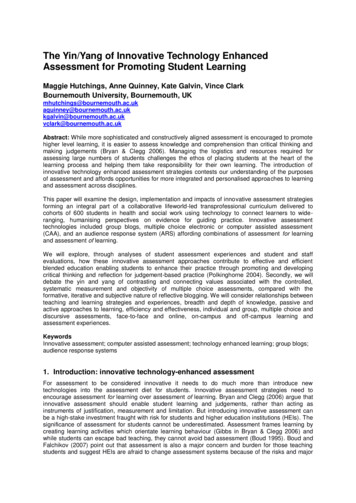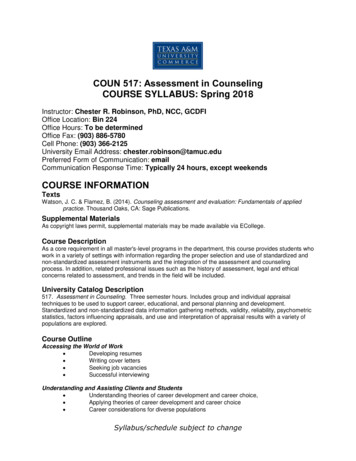
Transcription
Post meetingAssessment RegulationsUndergraduate Degree AwardsApproved:UAB 9 July 2014Minor Revisions: UAB 25 January 2016, 6 July 2016, 12 July 2017, 11July 2018Document Title: Assessment Regulations – Undergraduate Degree AwardsVersion No.1.5Author Role Title:Quality Manager (RFS)Superseded version:September 2017Approval Date:11 July 2018Approved by:Academic BoardEffective Date:17 September 2018Review Date:Annual
Contents1.Introduction12.2.12.2Application of the RegulationsStatus and ScopeVariance from the 113.123.133.143.153.163.173.183.193.20General ProvisionsFramework for Academic AwardsResponsibilitiesDefinition of AttemptStudying Additional Non-Contributory ModulesRecognition of Prior LearningEthical ComplianceAcademic MisconductConduct in ExaminationsExtenuating CircumstancesPenalties for the Late Submission of WorkRelease of Unratified MarksNotification of Assessment ResultsLanguage of Instruction and AssessmentIntermediate AwardsMaximum Period of RegistrationWithdrawal from a CoursePosthumous AwardsAegrotat AwardsRevocation of AwardsRight to Academic 44.54.64.74.8The Assessment of StudentsThe Purpose of AssessmentThe Role of Academic JudgementAssessment BoardsModule AssessmentModule ReassessmentModule Failure after ReassessmentRestudy the Level as though for the First TimeSubstitution of Failed Modules161616161818222323
5.5.15.25.35.45.55.65.7ProgressionScope and ApplicationGeneral Principles of ProgressionProgression of Part-time StudentsGeneral ProvisionsCompensation of Failed ModuleProgression DecisionsProgression between the Levels of a bility for AwardGeneral ProvisionsEligibility for the Award of Honours DegreeEligibility for the Award of Honours Degree (Sandwich Award)Eligibility for the Award of Named Non-Honours DegreeEligibility for the Award of Ordinary DegreeEligibility for the Award of Diploma of Higher EducationEligibility for the Award of Certificate of Higher assification/Grading of Awards34General Provisions34Classification of Honours Degrees35Classification of Honours Degrees (Sandwich Awards)36Classification of Non-Honours Degrees36Grading of Ordinary Degrees37Grading of Diplomas of Higher Education38Grading of Certificates of Higher Education and other University CertificateAwards388.8.18.2Assessment Regulations Summary ChartsProgression at the First Point of ConsiderationProgression at the Second Point of Consideration404041
Assessment Regulations for Teesside University UndergraduateDegree Awards1.INTRODUCTION1.1This edition of the Assessment Regulations for Teesside UniversityUndergraduate Degree Awards supersedes previous versions and applies to allstudents enrolled on Teesside University Undergraduate Degree Awards andModules from 17 September 20181.1.2The Regulations are supplemented by two other documents: the Glossary,which defines the key terms used in the Regulations; and the Variance Register,which details all approved variances from the Regulations.1.3Both staff and students are expected to be familiar with the Regulations.Sources of support for students in understanding the Regulations are published inStudent Handbooks. Students may also seek independent advice from the Students’Union. Staff can seek support by contacting the Academic Registry.2.APPLICATION OF THE REGULATIONS2.1Status and Scope2.1.1 Standard Regulations: These Regulations are the standard regulations forall Teesside University’s Undergraduate Degree courses regardless of location ormode of delivery. They will apply in their entirety to all undergraduate awards and toall students undertaking those awards, unless variance has been approved by, or onbehalf of, Academic Board.2.1.2 Awards of the University Offered by Partner Institutions: Where otherinstitutions deliver Teesside University awards under partnership and/or franchise1Students undertaking reassessment will be considered under the regulations in operation at the time theycommenced on the module(s) being reassessed.1 of 41Assessment Regulations for TU Undergraduate Degree Awards – Version 1.5
arrangements, those institutions and awards are bound by these Regulations subjectto any approved variance [see Section 2.2].2.1.3 Discretion: In clearly specified circumstances, Assessment Boards have thepower to exercise their discretion in the light of their academic judgement to ensurethat students are treated equitably and fairly, that academic standards aremaintained, and students are not disadvantaged by administrative or proceduralirregularities beyond their control. In exercising discretion, Assessment Boards musttake account of the views of the external examiner(s) and should ensure thatdecisions are taken in the spirit of these Regulations to the benefit of students.Decisions reached as a result of the exercise of discretion must be minuted togetherwith the reasons for the decision.2.1.4 Guidance on Implementation: Other than the guidelines and proceduresrelating to approved variance, where guidance is issued which supplements theseRegulations, the Regulations take precedence in the event of conflict.2.1.5 Chair’s Action: An Assessment Board may delegate its responsibilities tothe respective Chair in relation to recommendations concerning an individualstudent, subject to the approval of the relevant external examiner(s).Delegated responsibility should only be exercised in exceptional cases, for example:a) To correct errors and/or omissions in the assessment marks and/or moduleresults presented to an Assessment Board.b) To reconsider a decision of the Board in light of a recommendation made by anAcademic Appeal Committee following consideration of the evidence relating toan Academic Appeal Application.c) To instigate the Irregular Results Procedure or otherwise ensure students areconsidered justly and consistently.d) To recommend conferment of an award in light of the above.e) To consider module results and/or the conferment of an award for a very smallnumber of students where it is not practical to reconvene a Module and/orProgression and Award Board.2 of 41Assessment Regulations for TU Undergraduate Degree Awards – Version 1.5
2.1.6 Authority: The regulations in force at any time shall be those published onthe Student Regulations section of the University Website unless otherwise specified[see Section 2.1.8]. Students who register for an award part-way through anacademic year of study, or resume study after a period of interruption, will begoverned by the regulations in force at the time of such registration or resumption.2.1.7 Review and Approval of Regulations: The Regulations are reviewedperiodically to reflect changing institutional agendas and for the purpose of editorialamendment. This review process is informed by feedback from appropriate staff,students, external examiners and, where appropriate, other agents external to theUniversity. The Regulations pertaining to a semester will be published in advance ofits commencement.2.1.8 Changes to the Regulations: While the University reserves the right toamend the Regulations, changes will not normally be implemented within a year ofstudy. In exceptional cases (for example, following major review and modification),amendment to the Regulations may result in different cohorts of students registeredfor the same award being considered under different Regulations. Students will benotified in such cases and every effort will be made to ensure no cohort is undulydisadvantaged.2.2Variance from the Regulations2.2.1 Approval: Variance to these Regulations will normally only be approved tomeet specified requirements or expectations of Professional, Statutory & RegulatoryBodies [PSRBs] or other such external bodies that accredit awards of the University.Such variance must always be approved by, or on behalf of, Academic Board andrecorded in the Variance Register.2.2.2 Definitions: Variance from the Assessment Regulations will be of two kinds:a) Module Variance; and b) Course Variance:a) Module Variance is approved on behalf of Academic Board. It is sought fromthe relevant School Committee or course approval panels and only relates tomodule-specific regulations (for example, module-specific variance to the standardpass criteria). It is approved as part of the module approval process but must always3 of 41Assessment Regulations for TU Undergraduate Degree Awards – Version 1.5
be reported to Academic Board or its nominated Sub-Committee for the purposes ofoversight and accuracy of the Variance Register.b) Course Variance is approved on behalf of Academic Board. It is sought from itsnominated Sub-Committee. It will normally relate to course-wide regulations (forexample, standard progression profiles/criteria, and the classification of awards).Course variance is agreed in principle at course approval or by the relevant SchoolCommittee but must always be approved by Academic Board or its nominated SubCommittee for the purposes of oversight and accuracy of the Variance Register.3.GENERAL PROVISIONS3.1Framework for Academic Awards3.1.1 Credit Framework: All undergraduate degree courses consist of modules.Each module has its own learning outcomes and is designed, delivered, andassessed at an academic level consistent with those outcomes. Credit is awardedfor achievement of the specified learning outcomes of the module. Credit isaccumulated sequentially, by level, until the credit requirements and the associatedlearning outcomes for the award are met. All awards offered by the Universitycomply with the credit requirements of the national frameworks which identify andarticulate typical characteristics of HE awards. These requirements, as well as moreinformation about the operation of credit, can be found in the University’s Credit2Accumulation and Modular Scheme.3.1.2 Assessment and Feedback Policy: Assessment not only enables studentsto demonstrate they have achieved the learning outcomes; it also promotes highlevel learning. Feedback is an important part of the process which enables studentsto improve their learning. The University’s Assessment and Feedback Policy2The Credit Accumulation and Modular Scheme (CAMS) is available handbook/D1-CAMS.doc4 of 41Assessment Regulations for TU Undergraduate Degree Awards – Version 1.5
provides a framework for effective, appropriate and fair assessment practice that3promotes learning.3.1.3 Other Relevant Documentation: The Regulations are paramount indecision-making relating to matters of student progression, achievement, andclassification. However, in addition to these Regulations, the University operates anumber of other institutional policies and procedures which variously inform, support,or structure student learning. Where these other policies and procedures bear onthese Regulations reference is made to the full document.3.2.Responsibilities3.2.1Responsibilities of the University:3.2.1.1 Assessment and Regulatory Literacy: Regulations and policies shouldbe understood by staff and students and should not be a barrier to effectiveassessment practice and high-level student learning. In this respect, the Universityacknowledges that developing assessment and regulatory awareness is aparamount concern for both staff and students. Learning is most effective whenstudents and staff share an understanding of academic and professional standardsin an atmosphere of mutual trust. As such, the University will, over time, activelyengage students in a mutual dialogue about assessment processes in order toestablish a shared understanding of the meaning of academic standards andprofessional judgement.3.2.1.2 Information for Students: The University requires that students are madeaware of, and have access to, the following information:a) The relevant assessment regulations governing their course of study.b) The full details and requirements of their specific course of study.c) The learning outcomes, assessment criteria, weightings and assessment strategyfor each module.3The Assessment and Feedback Policy is available handbook/I-AFP.doc5 of 41Assessment Regulations for TU Undergraduate Degree Awards – Version 1.5
d) The criteria relating to grading and marking schemes.e) The reassessment arrangements for their course of study.f) The procedures for the submission of assignments, including the procedure andthe penalties for late submission of summative assessments.g) The grounds on which applications for mitigating circumstances and/orextensions to deadlines for assessed work can be made and the procedures fordoing so.h) The mechanism used to communicate results and the date this will occur.i) The grounds on which applications for academic appeal can be made and theprocedures for making such an appeal.j) The Regulations Relating to Academic Misconduct (Taught Components andProgrammes).43.2.2 Responsibilities of Students: The University is committed to providingstudents with the resources, opportunities, and the support required to becomesuccessful high-level learners. However, effective learning requires active personalengagement with these resources and purposeful participation in the learningopportunities provided. As such, students are expected to comply with theregulatory requirements of their course of study, attend scheduled classes, and carryout the prescribed learning activities for the modules on which they are enrolled. Inaddition, it is the responsibility of students to:a) Ensure they are aware of examination dates and coursework submission dates.b) Attempt all examinations and/or summative assessments [see Section 3.3].c) Inform the University if they are unable to attend classes in accordance with theUniversity’s Attendance Policy.54The Regulations Relating to Academic Misconduct (Taught Components and Programmes) areavailable 20Programmes).doc5The Attendance Policy is available licy.pdf6 of 41Assessment Regulations for TU Undergraduate Degree Awards – Version 1.5
d) Notify the University through the proper procedures of any extenuatingcircumstances which may have affected their performance and which they wishto be taken into account [see Section 3.9].3.3Definition of AttemptA module is deemed to have been attempted if a submission is made by the studentfor any component of summative assessment as defined in the Module Specification.No minimal mark needs to have been achieved in order for the submission to countas an attempt.An assessment is deemed to have been attempted if a submission is made by thestudent in accordance with the procedures defined for submitting the assignment.This entails the formal recording on receipt of the assessed work as detailed in the6University’s Regulations for the Submission of Assignments.An examination is deemed to have been attempted if the student accuratelycompletes the formal attendance card and submits at least one answer script with aproperly completed front cover.3.4Studying Additional Non-Contributory Modules3.4.1 Students who have gained sufficient credits for progression or award may notstudy additional modules as a means of improving marks, grades, or classificationoutcomes.3.4.2 Students wishing to study additional modules which do not form part of theirprimary course of study should make an application to the Dean of School who willconsider the request on an individual basis. The decision of the Dean of School isfinal.6The Regulations for the Submission of Assignments is available %20Assignments.pdf7 of 41Assessment Regulations for TU Undergraduate Degree Awards – Version 1.5
The study of additional modules is subject to timetable and other resourceconstraints. Additional module credits do not contribute to the student’s primaryaward or any classification/grading of this award.3.5Recognition of Prior LearningStudents may be permitted to enrol onto courses with advanced standing byRecognition of Prior Learning [RPL] or through an approved articulation orprogression route. Such prior learning may be certificated or experiential or acombination of both. In such cases, students are awarded credit for experiencegained elsewhere. The approved processes by which entry with advanced standingmay be permitted are available on the University website7.3.6Ethical ComplianceStudents are expected to consider the ethical implications of everything they say, write orotherwise communicate in their assessment tasks. In addition, where applicable,students are required to comply with appropriate ethical release/approval processes.8These are defined in the Policy, Procedures & Guidelines for Research Ethics.3.7Academic MisconductStudents are expected to observe the University’s regulations which define and9proscribe cheating, plagiarism and other forms of academic misconduct.3.8Conduct in ExaminationsStudents are expected to observe the University’s instructions relating to conduct inundertaking examinations. Regulations relating to the conduct of examinations are78Recognition of Prior Learning (RPL) PolicyThe Policy, Procedures & Guidelines for Research Ethics is available thics.pdf9The Regulations Relating to Academic Misconduct (Taught Components and Programmes) areavailable 20Programmes).doc8 of 41Assessment Regulations for TU Undergraduate Degree Awards – Version 1.5
specified in Appendix 4 of the Regulations Relating to Academic Misconduct (Taught8Components and Programmes).3.9Extenuating CircumstancesThe University recognises that there may be times when, due to adversecircumstances beyond their control, a student may be unable to meet an assessmentdeadline, or cannot complete assessments to the best of their ability, or are unableto attend an examination. In such circumstances, the University operatesExtenuating Circumstances Regulations (Taught Components and Programmes) toenable students to request that such circumstances are taken into consideration.There are three types of remedy that may be offered to a student who isexperiencing difficulties outside her/his control:a) An Extension of the assessment deadline to a later date.b) A formal application for Mitigating Circumstances.c) Interruption of Studies until an agreed date.Details of these processes are set out in the University’s Extenuating CircumstancesRegulations.3.1010Guidance for students is available on the University’s website.Penalties for the Late Submission of WorkWhere coursework is submitted later than the original deadline without the priorapproval of an extension or mitigation, or where coursework is submitted beyond anagreed extension, then the following tariffs apply:a) 1-7 calendar days late: work is capped at 40%.b) Beyond 7 calendar days late: work will receive a mark of 0%.Where submission is in relation to the reassessment of previously failed coursework,any work submitted beyond the submission date without authorisation will receive a10The University’s Extenuating Circumstances Regulations are available here:http://www.tees.ac.uk/docs/index.cfm?folder student%20regulations&name Academic%20Regulations9 of 41Assessment Regulations for TU Undergraduate Degree Awards – Version 1.5
mark of 0%. An extension will only be given at reassessment in exceptionalcircumstances.3.11Release of Unratified MarksA provisional mark for summative assessments will be communicated individually tothe student as and when the mark has been internally moderated as part of thefeedback process. This will be communicated at the earliest opportunity and notnormally later than 20 working days after the date of submission. Definitive markscan only be agreed by Module Assessment Boards after any external moderationhas taken place. Definitive marks will be released to the student as part of theNotification of Assessment Results process [see Section 3.12].3.12Notification of Assessment Results3.12.1Results3.12.1.1 The Student Information System [SITS] is the official repository of allstudent results.3.12.1.2 On completion of a meeting of an Assessment Board, or following adecision made by Chair’s Action, the Chair is responsible for ensuring that details ofall ratified marks/grades and all decisions taken by the Board are entered into theStudent Information System.3.12.1.3 The Department of Finance and Commercial Development [FCD] isresponsible for ensuring that accurate results lists are available for use byAssessment Boards.3.12.2Communication of Results to Students3.12.2.1 Students studying for University awards will be informed within two weeksof the commencement of their course of the date by which, and the manner in which,they will be notified of their ratified results/grades and the decision taken by theAssessment Board.3.12.2.2 The mechanism of communicating results to students established by theprocess defined in Section 3.12.2.1 shall be considered to be the formal notification10 of 41Assessment Regulations for TU Undergraduate Degree Awards – Version 1.5
of those results and the date on which they are issued shall count as the date ofpublication.3.12.2.3 The University will retain an auditable record of the formal communicationto students of ratified results/grades and Assessment Board decisions, including anyinstructions to students regarding reassessment. The record will include both thecontent of the communication and its time/date.3.12.2.4 The University will ensure students are informed that it is the responsibilityof each student to ascertain their results by the means communicated to them.3.12.2.5 The University shall communicate information to students on ratifiedresults concerning:a) Module marks or grades.b) Progression to the next level of a course.c) The award of a qualification.d) Any compensation that has been awarded.e) The opportunity to undertake reassessment or deferred assessment, includingdetails of relevant modules and assignments.f) The offer to restudy individual modules or levels of a course;g) Any other decisions taken by the Assessment Board.3.12.2.6 Where a student has been awarded a qualification or withdrawn from theircourse of study, a transcript shall be issued by the Department of Finance andCommercial Development showing the marks or grades for all modules undertakenand any qualification that has been awarded.Otherwise, a record of progress shall be issued annually by the Department ofFinance and Commercial Development showing the marks or grades for all modulesundertaken.3.12.2.7 The transcript shall be the official record of a student’s academicachievement and may take the form of a Diploma Supplement, or a HigherEducation Achievement Record.11 of 41Assessment Regulations for TU Undergraduate Degree Awards – Version 1.5
3.12.3Withholding of Results3.12.3.1 The decisions of Assessment Boards in relation to non-excluded studentsowing the University payment for tuition fees or academic charges may not beconveyed to students until confirmation is received from the Finance Office that thedebt has been paid.3.12.3.2 When an Assessment Board requires a non-excluded student debtor to resit an examination or undertake reassessment, the student will be informed in thenormal way, but the outcome of such opportunities may not be conveyed to thestudent by the Assessment Board.3.12.3.3 The University may withhold final results, certificates and transcripts, fromstudents with debts relating to the academic experience even if they have madearrangements to pay their outstanding debt. Such students may not be invited toattend any Academic Awards Ceremony and their name may not appear in theAcademic Awards Brochure.3.13Language of Instruction and AssessmentThe primary language of instruction will be English. Unless otherwise approved byvariance, all modules which contribute to an award of the University must be taughtand assessed in English.3.14Intermediate AwardsIf a student fails to satisfy the requirements for a primary target award, anintermediate award may be conferred if the credit requirements and associatedlearning outcomes for that award have been met. These requirements will bespecified either at course approval or in the University’s CAMS framework. At thediscretion of the Progression and Award Board, higher-level credit can substitute forlower-level credit to meet the requirements for an intermediate award. Lower-levelcredit cannot be substituted for higher-level credit. Intermediate awards are noteligible for overall classification/grading.12 of 41Assessment Regulations for TU Undergraduate Degree Awards – Version 1.5
3.15Maximum Period of RegistrationThe maximum period of registration on a course of study is the normal full-timeregistration period plus three years. This includes all periods of interruption whenthe student’s registration is formally suspended. Some courses accredited byprofessional, statutory and regulatory bodies [PSRB] may specify a shortertimescale. The standard maximum registration period for undergraduate awards isas follows:AwardCertificate of Higher EducationNormal Period ofRegistrationFull-time Part-time12Maximum Period ofRegistrationFull-time Part-time45Diploma of Higher Education2457Foundation Degree2457Ordinary Degree3669Honours Degree3669Honours Degree with Sandwich Year48711Honours Degree with Foundation Year487113.15.1 Registration of Part-Time Students: Assessment Boards can withdrawpart-time students if they have not formally interrupted their studies and have notfulfilled either of the following requirements:a) Enrolled or re-enrolled as required in the current academic year.b) Studied the minimum number of credits, normally 30, required to continue on thecourse.In such cases, the Assessment Board will confer an intermediate award on the basisof any credits and associated learning outcomes achieved at the University.3.16Withdrawal from a CourseA student can withdraw from their course of study, or, where it is clear that he/she isno longer attending or engaging with their studies, arrangements will be made fortheir withdrawal from the award and their enrolment with the University terminated.13 of 41Assessment Regulations for TU Undergraduate Degree Awards – Version 1.5
A student must advise the University in writing if they wish to withdraw from their courseof study. Students who withdraw from their course of study, or whose enrolment isterminated by the University, will be considered for an intermediate award at the nextmeeting of the course’s Progression and Award Board.3.17Posthumous AwardsAny award of the University, as detailed in the Schedule of Awards described in theCAMS framework, may be conferred posthumously. The normal conditions of theaward must be satisfied.3.18Aegrotat AwardsIn instances where a student is unable to complete their course of study and he/shehas not met the requirements for the intended award, an Aegrotat award may beconferred. The following conditions apply:a) Unforeseen exceptional medical or other sufficient circumstances prevent thecandidate completing the award for which they are registered.b) The Assessment Board is nevertheless satisfied that the candidate would havequalified for the award had it not been for such valid cause.c) The candidate, or a person authorised to act on their behalf, has indicated thatthey are willing to accept the award prior to its recommendation to anAssessment Board.d) The candidate, or a person authorised to act on their behalf, has agreed in writingthat, in accepting the award they are waiving the right to be reassessed.e) If conferred, an Aegrotat is an exit award and, as such, is the conclusion of thestudent's course of study.f) An Aegrotat award cannot be conferred to students on courses accredited by aPSRB which does not sanction this form of award.When conferring an Aegrotat award, the decision of the Board must be based on thestudent’s overall profile and evidence of some completed work at the level of theaward being recommended.Aegrotat awards are unclassified/not graded. They will be listed as one of the following:14 of 41Assessment Regulations for TU Undergraduate Degree Awards – Version 1.5
i. Aegrotat Certificate of Higher Education.ii. Aegrotat Diploma of Higher Education.iii. Aegrotat Bachelor’s Degree (unclassified).Aegrotat awards can be awarded posthumously. In such cases, the requirement tosecure agreement that, in accepting the award, the right to reassessment is waivedin line with Section 3.18.d) does not apply.A student who does not wish to accept an Aegrotat award may choose to bereassessed under the provisions of Section 4.5. A candidate who subsequently failssuch a reassessment is not then eligible to claim the Aegrotat award.3.19Revocation of AwardsThe University reserves the right to revoke an award, and all privileges and rightsassociated with that award, where it is established that a student has obtained anaward by fraud or deception or where other circumstances come to light after theaward is made which, if known at the time, would have meant the award would nothave been made. The student concerned may appeal this decision through theUniversity's Academic Appeal Regulations procedures.3.2011Right to Academic AppealUnder certain conditions, a student has a right of appeal against assessment and/orexamination decisions in accordance wit
Approved: UAB 9 July 2014 Minor Revisions: UAB 25 January 2016, 6 July 2016, 12 July 2017, 11 July 2018 Document Title: Assessment Regulations - Undergraduate Degree Awards Version No. Superseded version: 1.5 September 2017 Author Role Title: Quality Manager (RFS) Approval Date: 11 July 2018 Approved by: Academic Board


